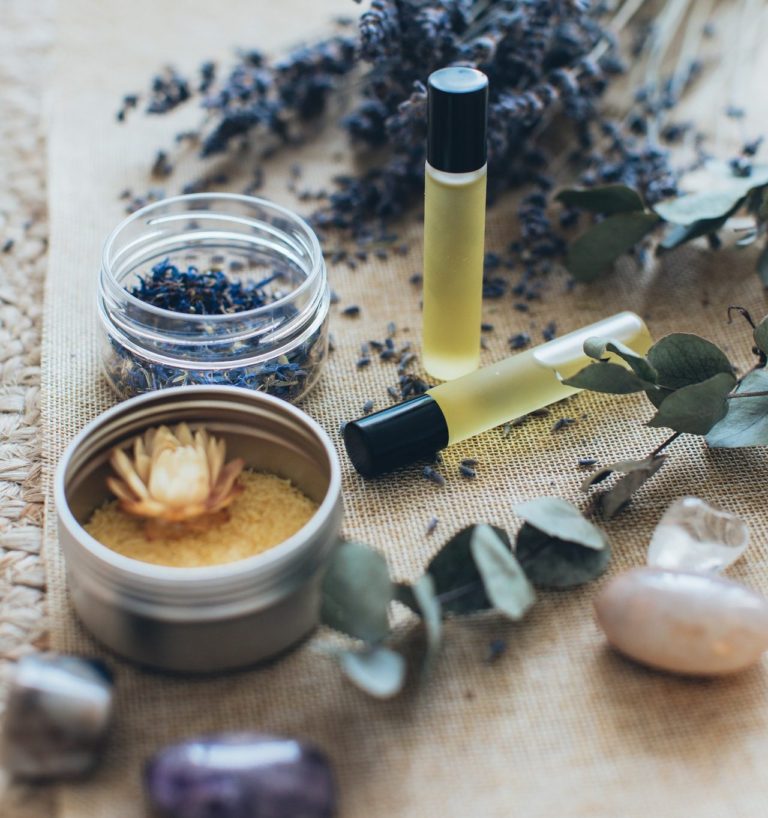A Beginner’s Guide
If you’re interested in using essential oils for natural skin care but don’t know where to start, this guide is for you. We’ll cover the basics of essential oils and skin care, including what essential oils are, how to use them, and some beginner-friendly recipes. Keep reading to learn more!
What are essential oils?
Essential oils are concentrated extracts from plants. They are called “essential” because they contain the essence or characteristic fragrance of the plant. Essential oils have been used for centuries in a variety of contexts, including healing, relaxation, and beauty.
There are many different types of essential oils, each with its own unique smell and benefits. Some popular essential oils for skin care include lavender oil, tea tree oil, and rosehip oil. Essential oils have many uses and purposes, including promoting the health and beauty of our largest organ, which is the skin.
Our skin is the first thing that people notice about us, so we always want to keep our skin in its best shape possible so that we appear and feel at our absolute best. Essential oils are in wonderful harmony since they may improve both the look and feel of skin while also promoting general health on all levels.
You can buy essential oils online or at health food stores and they are fairly inexpensive.
Here are some of the greatest essential oils for skin health.
Lavender Oil: Lavender oil is one of the most popular essential oils for skin care. It’s often used to soothe dry, irritated skin and calm redness and inflammation. Lavender oil can also be helpful in treating acne breakouts and reducing the appearance of scars and blemishes. To use lavender oil for skin care, add a few drops to your favorite moisturizer or face oil and apply it to your skin. You can also add a few drops of lavender oil to your bathtub for a relaxing, stress-reducing soak.
Rosemary Oil: Rosemary oil is another good choice for people looking for an all-natural way to improve their skin health. This oil is known for its ability to improve circulation and promote cell regeneration. Rosemary oil is also naturally antibacterial and antifungal, which makes it an excellent choice for people with acne-prone skin. To use rosemary oil on your skin, add a few drops to your favorite cleanser or moisturizer and apply it as usual. You can also make your own rosemary-infused facial toner by adding a few drops of rosemary oil to distilled water in a spray bottle. Simply mist the toner onto your face after cleansing and before applying moisturizer.
Tea Tree Oil: Tea tree oil is another popular essential oil for skin care. It has potent antibacterial and anti-inflammatory properties, making it an effective treatment for acne breakouts. Tea tree oil can also help soothe irritated skin and reduce redness and swelling. To use tea tree oil for acne, mix a few drops with water in a spray bottle and spritz it on your face after cleansing. You can also add tea tree oil to your favorite face mask or spot treatment to boost its efficacy.
Chamomile Oil: Chamomile oil is an excellent choice for sensitive skin. It’s gentle but effective in calming irritation, redness, and inflammation. Chamomile oil can also help reduce the appearance of scars and blemishes. To use chamomile oil for sensitive skin, add a few drops to your favorite lotion or cream and apply it to your skin twice daily. You can also add chamomile oil to your bathtub for a relaxing soak that will soothe your skin.
Rosehip Oil: Rosehip oil is rich in antioxidants and vitamins A, C, and E, making it an excellent choice for mature or sun-damaged skin. These nutrients help to repair damage caused by free radicals, while also decreasing the appearance of wrinkles and fine lines. To use rosehip oil for skin care, apply a few drops directly to your face and neck after cleansing. You can also add a few drops to your favorite moisturizer or serum.
Frankincense oil: Frankincense oil is ideal for mature or dry skin types. Its hydrating and nourishing properties help to promote cell regeneration and diminish the appearance of fine lines and wrinkles. In addition, frankincense oil has anti-inflammatory properties that can help to reduce redness and swelling associated with various skin conditions like psoriasis.
Ylang Ylang: Ylang-ylang essential oil is a great addition to your night cream since it aids in the equilibrium of your skin’s oils and moisture levels. As a result, it’s an excellent oil to use in a night cream. Ylang-ylang oil will help you regain your youth with regular application.
Using Essential Oils Safely
Once you’ve selected the right essential oils for your natural skincare routine, it’s important to use them safely in order to avoid irritating or damaging your skin. When using essential oils topically (i.e., on your skin), always dilute them with a carrier oil such as jojoba or coconut before applying them directly to your skin. This will help to prevent irritation and ensure that the essential oils are properly diluted before coming into contact with your skin.
To get started with using essential oils for your skin, try one of these recipes:
Essential oils can be a great addition to your natural skincare routine. They are potent plant extracts that can provide a wide range of benefits depending on the type of oil you use.
If you are pregnant or breastfeeding consult with a qualified health professional before starting Essential oil or Aromatherapy.
Thank you for reading,
Peacefully Yours!

